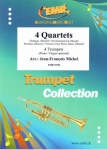Shop Auswahl
Unterkategorien
Kategorien
Willkommen zurück!
Zuletzt angesehen
Komponist:
Traditional Arrangeur:
Creux, Fulvio Besetzung:
Blasorchester
Genre:
Feierliche Musik • Marsch Produktart:
Partitur • Stimmensatz Il Testamento del Capitano, Sul ponte di Bassano, Ta-pum, La tradotta, Sul cappello che noi portiamo
The First World War, commonly known as the “Great War”, was an event of outstanding importance in the history of mankind. Fought mainly on the Italian-Austrian front, the trenches were home for a long time to soldiers on both sides. Many songs were written during this period. Some were based old themes, others were folksongs that were invented spontaneously. All have several characteristics in common: a feeling of sadness, of longing for a sweetheart who is far away, hearty drinking sessions, but also of heroism and the common ideals of patriotism. This short fantasia based on music from the “Great War” is an arrangement for modern bands featuring some of the best-known and most significant tunes. It is rather more than a collection of ballads and attempts to recreate the atmosphere of that period. The expressiveness of the opening bars is reminiscent of Verdi’s Nabucco symphony. This is followed (bar 9) by a quieter theme set in an open, contemplative atmosphere, which immediately makes way (from bar 15 onwards) for the theme from “Il testamento del Capitano”. Meanwhile, (bar 13) a fragment of the theme from “Sul ponte di Bassano” appears. This theme persists throughout the composition (see bars 34, 81) which finally leads to the “Grandioso” finale in bar 84, where the song appears in its full magnificence. The central part is based on another famous song, “Ta-pum”. This adds some variety to the composition, as it is presented as a waltz, and appears to create the sound of a barrel-organ (especially from bar 54 onwards). A theme from “La tradotta” (bar 77 onwards) ferries us on towards the conclusion, while the closing theme of another song (“Sul cappello che noi portiamo”) is used as a “coda” on two occasions, in bars 28 and 94. The fantasia ends with a plagal cadence based on the initial theme from “Sul ponte di Bassano”.
The First World War, commonly known as the “Great War”, was an event of outstanding importance in the history of mankind. Fought mainly on the Italian-Austrian front, the trenches were home for a long time to soldiers on both sides. Many songs were written during this period. Some were based old themes, others were folksongs that were invented spontaneously. All have several characteristics in common: a feeling of sadness, of longing for a sweetheart who is far away, hearty drinking sessions, but also of heroism and the common ideals of patriotism. This short fantasia based on music from the “Great War” is an arrangement for modern bands featuring some of the best-known and most significant tunes. It is rather more than a collection of ballads and attempts to recreate the atmosphere of that period. The expressiveness of the opening bars is reminiscent of Verdi’s Nabucco symphony. This is followed (bar 9) by a quieter theme set in an open, contemplative atmosphere, which immediately makes way (from bar 15 onwards) for the theme from “Il testamento del Capitano”. Meanwhile, (bar 13) a fragment of the theme from “Sul ponte di Bassano” appears. This theme persists throughout the composition (see bars 34, 81) which finally leads to the “Grandioso” finale in bar 84, where the song appears in its full magnificence. The central part is based on another famous song, “Ta-pum”. This adds some variety to the composition, as it is presented as a waltz, and appears to create the sound of a barrel-organ (especially from bar 54 onwards). A theme from “La tradotta” (bar 77 onwards) ferries us on towards the conclusion, while the closing theme of another song (“Sul cappello che noi portiamo”) is used as a “coda” on two occasions, in bars 28 and 94. The fantasia ends with a plagal cadence based on the initial theme from “Sul ponte di Bassano”.
Folgende Optionen können gewählt werden um diese Ausgabe zu konfigurieren:



